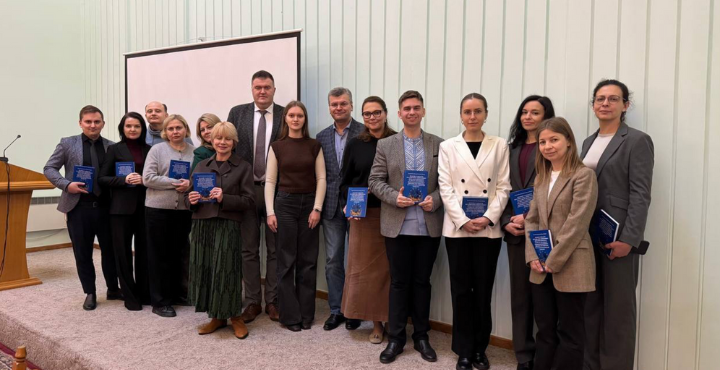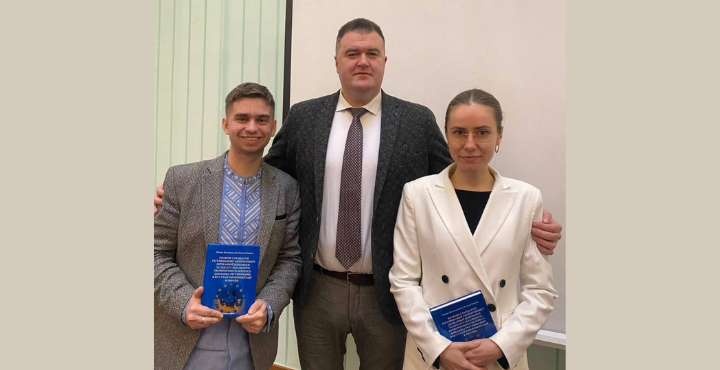Presentation of the scientific monograph by graduates of the IIR: European law as a guide for reconstruction

On November 6 2025, in the Hall of the Academic Council of EaS IIR of Taras Shevchenko National University of Kyiv, a presentation of a monograph by graduates of the Institute — Bohdan Veselovskyi and Natalia Fokina — took place: "Legal Standards for Regulation and Monitoring of State Aid and Services of General Economic Interest: Regulation Dynamics in the EU and State of Implementation in Ukraine."
The publication was prepared with the support of the European Union within the framework of the Jean Monnet Chair "Advanced Study of EU Values and Law: Ukrainian Context," operating at the National Law University named after Yaroslav Mudryi under the leadership of Professor Tetiana Komarova (Erasmus+ 101126844 – ASEU – ERASMUS-JMO-2023-HEI-TCH-RSCH).
The monograph is dedicated to analysing the legal standards for regulating and monitoring state aid and services of general economic interest within the legal systems of the European Union and Ukraine. The authors examine the evolution of approaches to state support, mechanisms of control and monitoring, as well as the challenges of integrating EU law norms into Ukraine's domestic legal system within the context of its European integration commitments.
In her speech, Natalia Fokina noted that the research aims to "identify conceptual challenges facing Ukraine in the process of deeper integration into the EU internal market," not only to describe legal norms. She emphasized that "implementation of European standards requires a shift from a formal to a substantive approach in the qualification of state aid."
Bohdan Veselovskyi revealed the topic of services of general economic interest (SGEI), calling them "the core of the European social model, combining market efficiency with the public good." He stressed, "SGEI is a legislative bridge between the market and society. For Ukraine, this is not just harmonization but a new quality of state policy — a market with a human face."
Vice-Rector for International Cooperation, Doctor of Law, Professor Kseniia Smyrnova emphasized that "a school of state aid researchers in Ukraine is already forming, and this is extremely relevant for future reconstruction. Such research shows that Ukrainian legal doctrine can think strategically and systemically."
Acting Head of the Chair of Comparative and European Law, Doctor of Law, Mykhailo Buromenskyi, stated that this monograph is the first comprehensive work in Ukrainian doctrine dedicated to the institute of state aid.
Professor Tetiana Komarova, Head of the EU Law Department at the National Law University named after Yaroslav Mudryi and Chair of the Jean Monnet Department, said: "Development of European law in Ukraine is possible only through synergy of scientific schools. And I am sincerely glad that such cooperation between Kharkiv and Kyiv has produced such a powerful result."
The authors express sincere gratitude to the Jean Monnet Chair, led by Professor Tetiana Komarova, for their support in printing the publication and for their systematic work on developing research in the field of European Union law in Ukraine.

Professor Oleksiy Kot, Director of the Institute of Legislative Studies and Legal Expertise of the National Academy of Sciences of Ukraine, noted that "it is extremely important that young scientists work on practical topics directly affecting the economic policy of the state."
Representatives of the Antimonopoly Committee of Ukraine (AMCU), Yana Tkachenko and Larysa Sotnik, thanked the authors for the relevance of the research and contribution to the development of state aid control practice. The authors handed over printed copies of the monograph to the Department of Control and Monitoring of State Aid of the AMCU.
The presentation gathered representatives of the scientific community, government bodies, and partners from various cities of Ukraine. The event was not just a book presentation but a symbol of how Ukrainian legal science is becoming an equal part of the European research space, where synergy of ideas gives birth to new standards for state reconstruction.